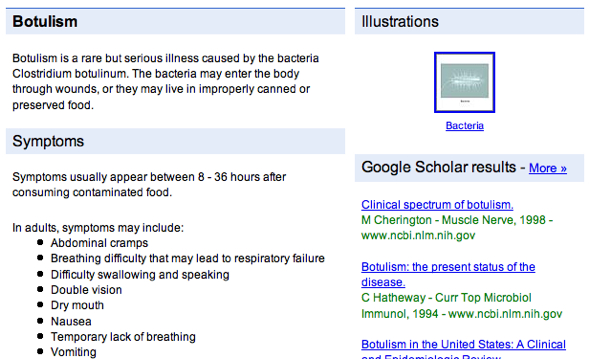 Google Health, the search giant’s site for sharing medical records and finding health-related services, has gone live.
Google Health, the search giant’s site for sharing medical records and finding health-related services, has gone live.
There have been plenty of false alarms on this front — most recently, the Wall Street Journal reported that the site would launch in February, but Google quashed that rumor. This time, however, you can log in and see the site for yourself.
With Google Health, users can build a personal health profile, import their records from hospitals and pharmacies, research different diseases (see screenshot below) and locate doctors, hospitals and online medical services. You can read more about the service at the Google Health FAQ.
When Google Search Product Vice President Marissa Mayer made the company’s first official announcement, she said Google Health will stand out through its privacy and security, its role as a platform for third-party services and its portability.
Google says users will have complete control over what records they share, which is probably a necessary step to make users feel comfortable with loading highly personal information onto the site. But it’s not immediately clear how Google Health will address the concern raised by VentureBeat’s former LifeScience Editor David Hamilton and others: How useful will the shared records be if patients can choose to hide potentially embarrassing information from doctors?
Google Health already held in a trial partnership with the Cleveland Clinic. The service is free of charge and apparently free of ads, too.
Company executives are talking about the launch at the Google Factory Tour, which a number of sites are liveblogging. I’ll update this post if more details emege.
Update: Larry Dignan of ZDNet took a close look at the terms of service, and notes that Google says the normal privacy protection law — the Health Insurance Portability and Accountability Act of 1996 — doesn’t apply. Google Senior Product Counsel Mike Yang says that’s because the company doesn’t provide healthcare services. Yang also provides a comparison between HIPAA and Google’s privacy policy.


